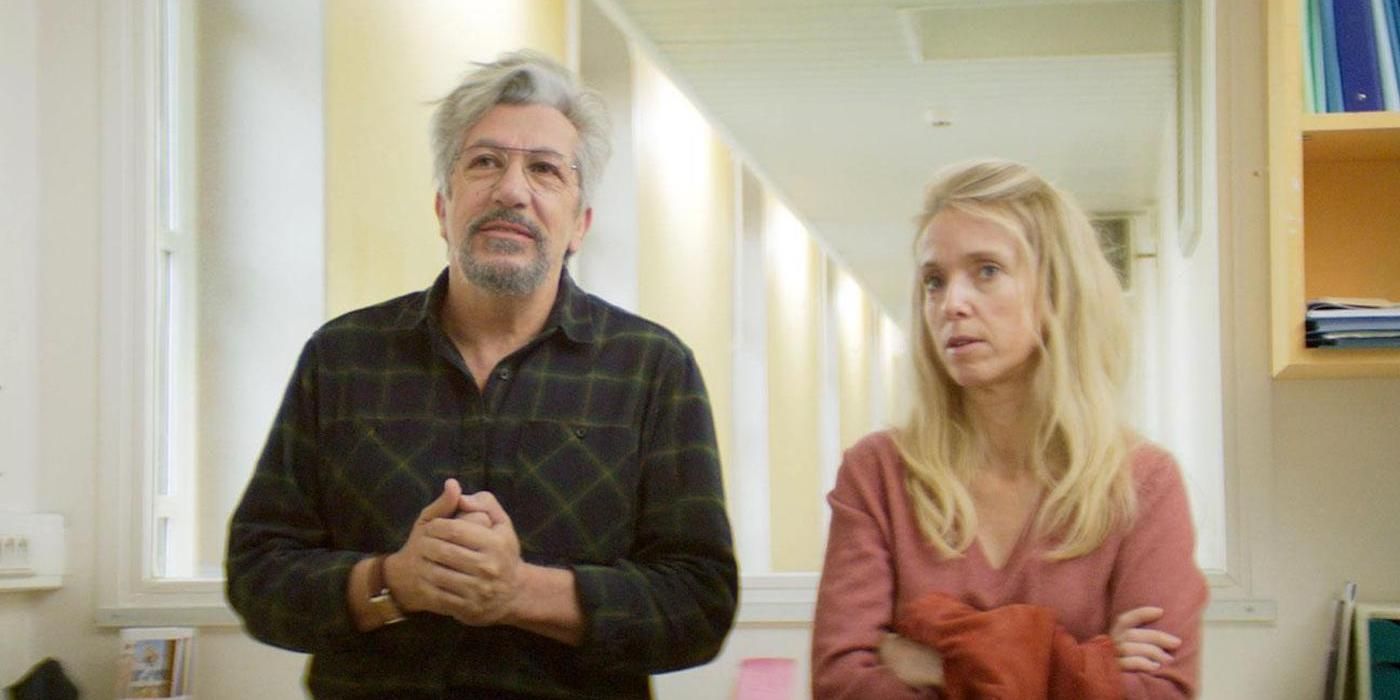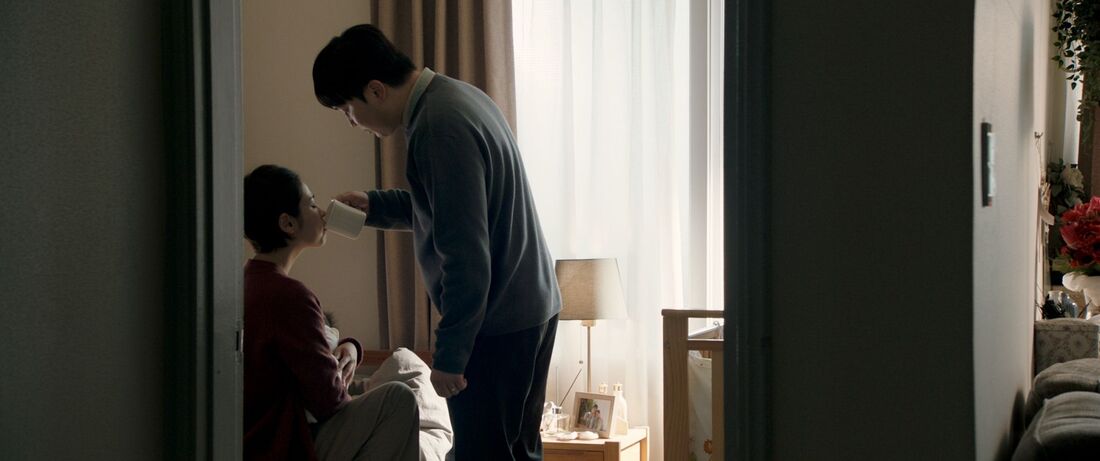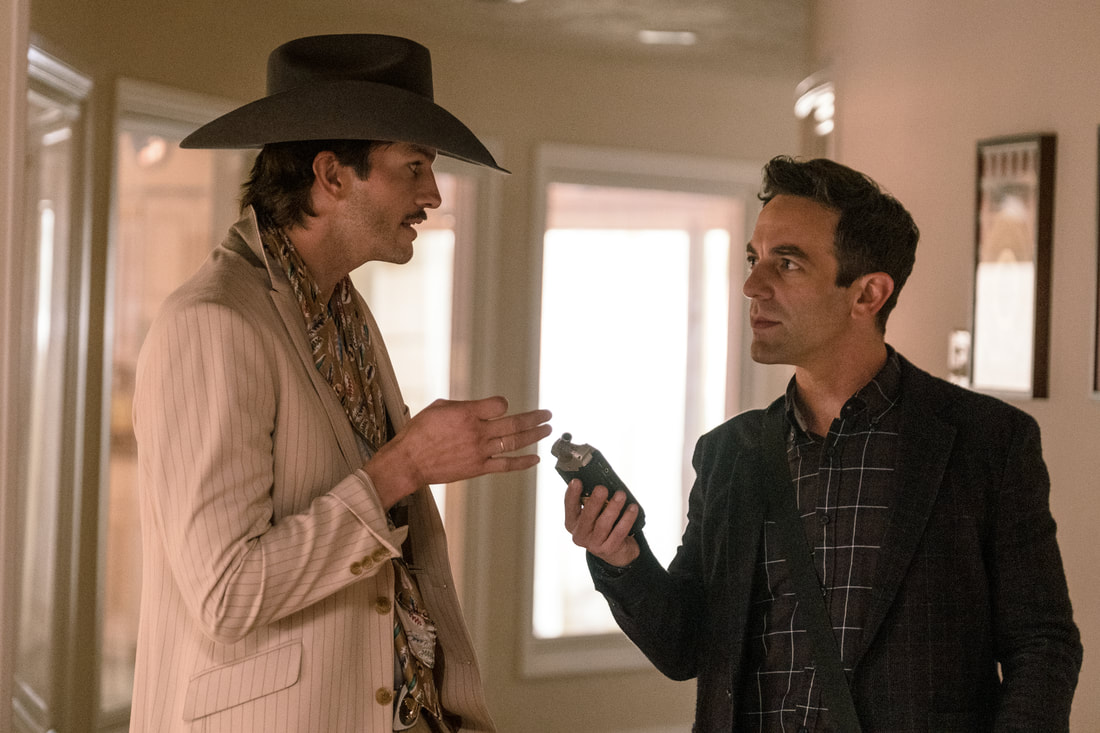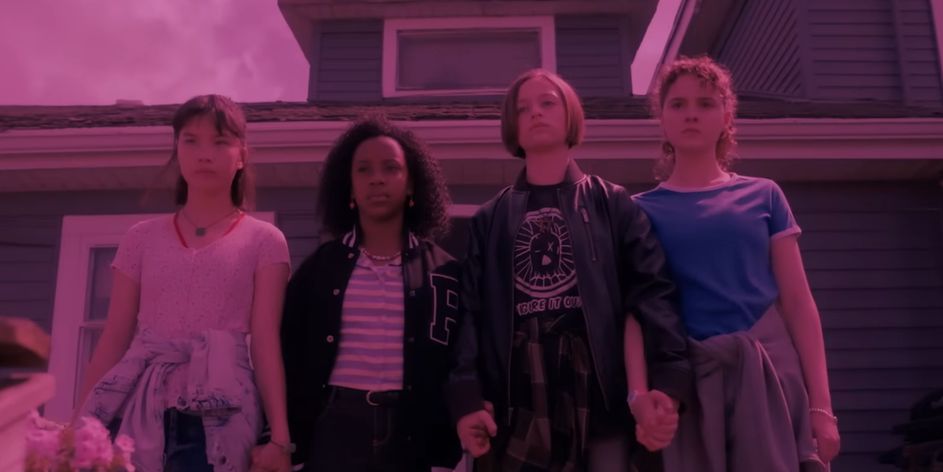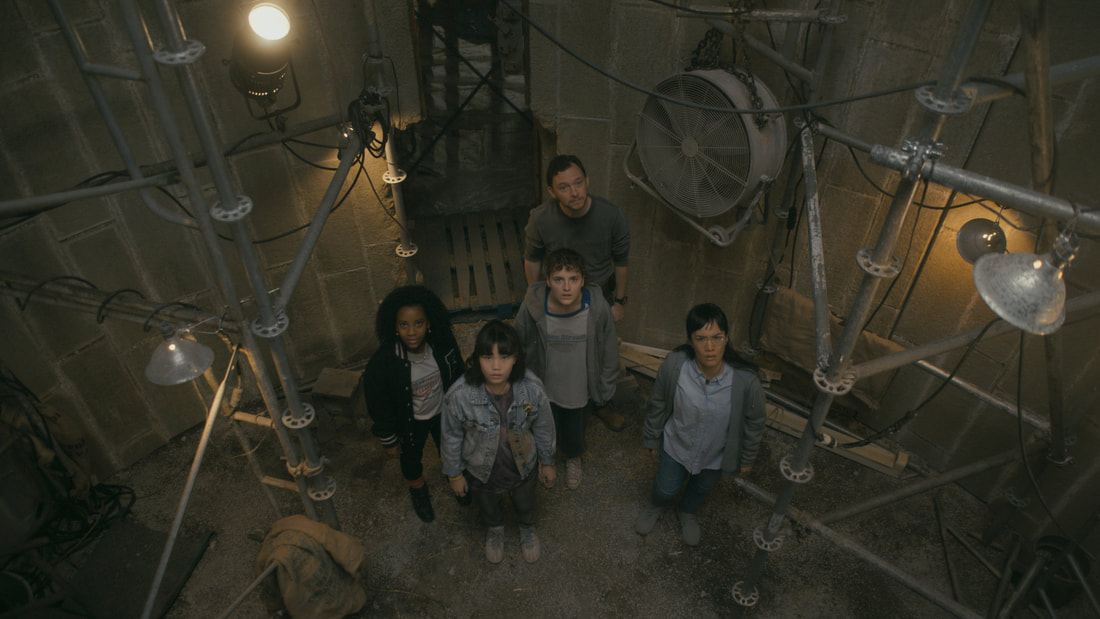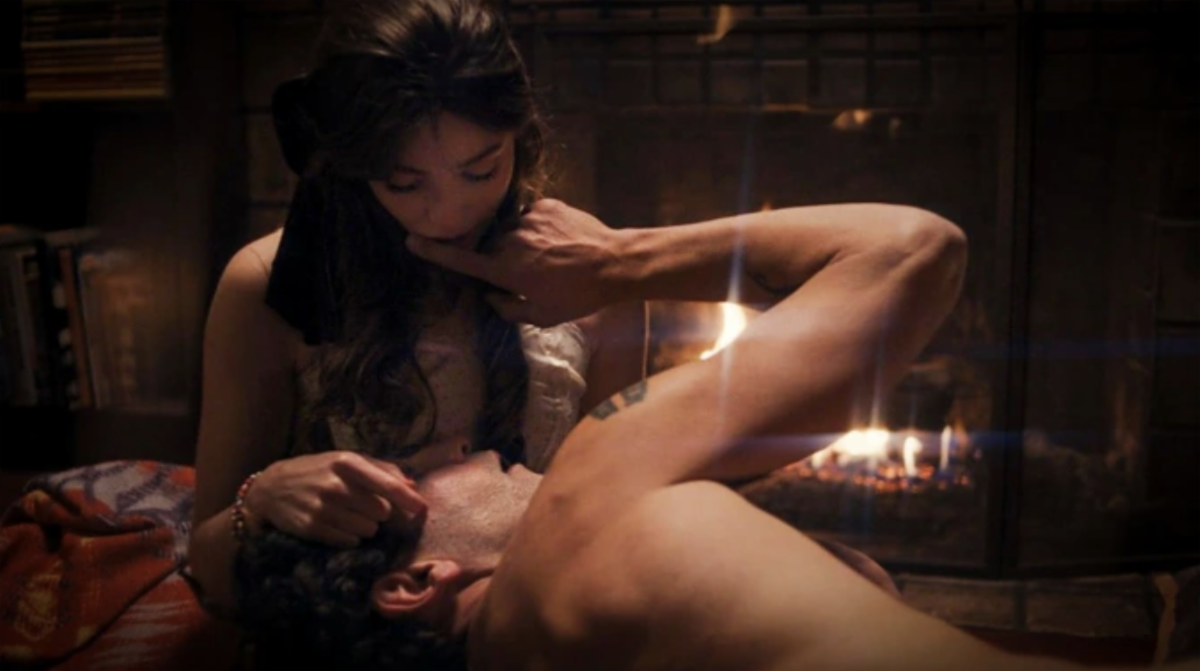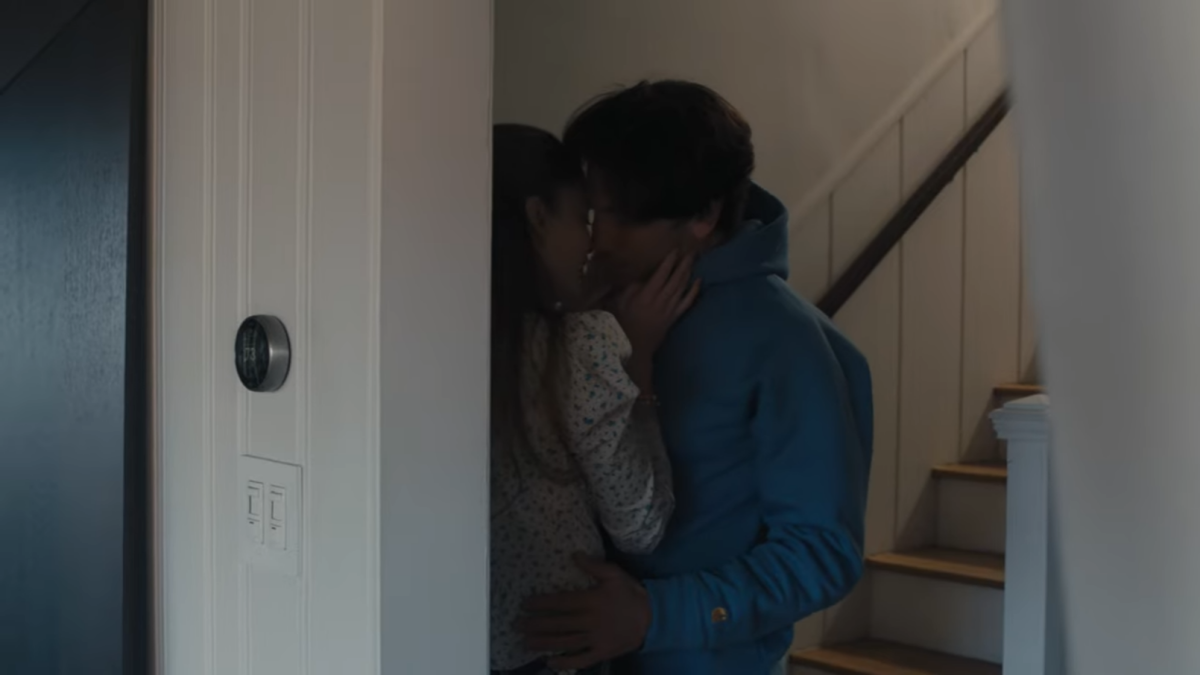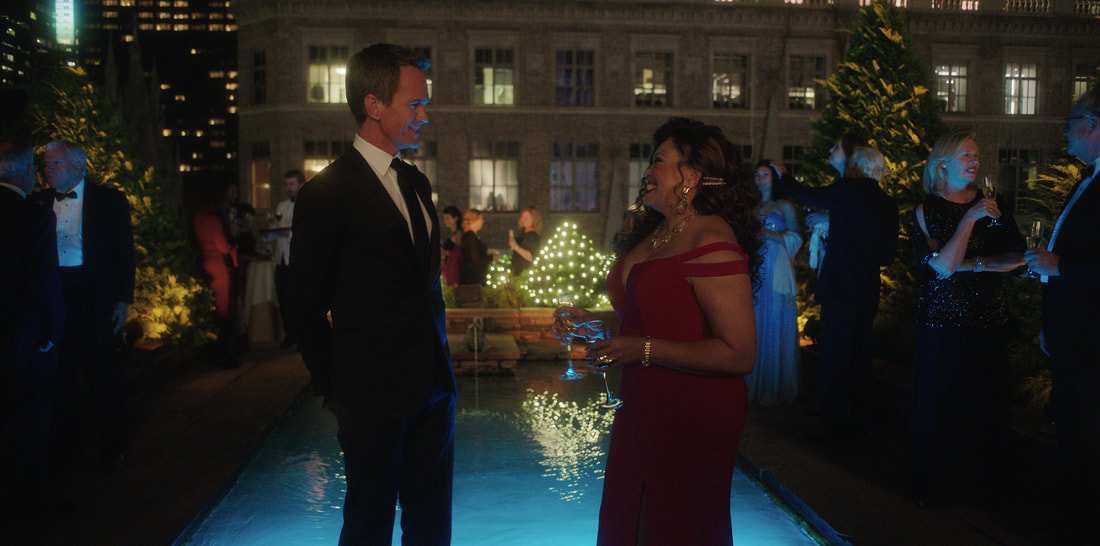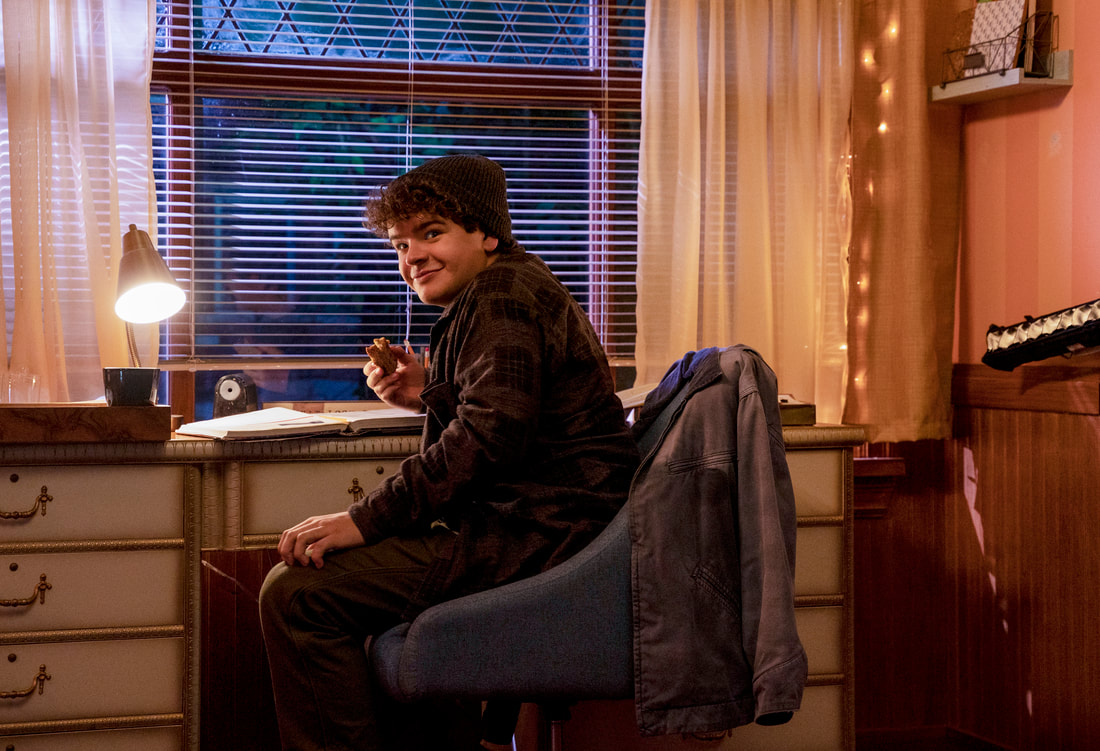|
Review by Sean Boelman
Quentin Dupieux makes a very distinctive style of absurdist comedies, so fans should be used to what he brings to the table by now. Incredible but True is somehow both his most stripped-down and maximalist film yet, although it struggles with finding the meaning that is what makes Dupieux’s work so special.
The movie follows a couple who move into what seems to be the home of their dreams, only to discover that the basement harbors an unexpected dark secret. Dupieux is known for taking these simple, absurd premises and making something profound out of them, but this one feels disappointingly shallow compared to the rest of his work. What is perhaps most surprising is that a majority of the most interesting commentary comes not from the core premise, but a side plot that amounts to little more than a running gag. It’s occasionally very funny but grows repetitive after a bit, especially when the critique of masculinity starts to run out of steam. In fact, that ends up being the issue with much of the film as a whole. There are some interesting ideas explored in the first twenty minutes, but Dupieux cannot sustain them, even for the movie’s brief seventy-four-minute runtime. Even his trademark goofy humor cannot keep the audience interested. The dynamic between the four central characters is intriguing, but there simply isn’t enough time for it to be fully developed. As a result, it ends up giving the film an almost melodramatic feel. And although Dupieux typically thrives in working with exaggerated relationships, this movie largely comes up short. Even more disappointing is the fact that everyone in the cast seems to be on autopilot. The central players are all A-list French actors: Alain Chabat, Lèa Drucker, Benoît Magimel, and Anaïs Demoustier. Yet out of the four, only Magimel gets anything substantially funny to do in his role. There are a few interesting visual symbols throughout the movie, but they are not fully utilized. One recurring motif poses some interesting questions, serving as the central thesis of the film, but it leaves something to be desired. And there is one visual gag that is quite funny and memorable. Incredible but True is the rare disappointment from Quentin Dupieux. Although it has a solid premise, it ends up feeling largely underbaked and underwhelming in regards to what it does with its story. Incredible but True screened at the 2022 Fantasia International Film Festival. which runs July 13 through August 3. Rating: 2.5/5
0 Comments
Review by Sean Boelman
Fantasia is primarily known for two things: Asian cinema and horror films. Kang Park’s extraordinary feature debut Seire is the intersection of the two, a genuinely disturbing slow-burn psychological horror movie that uses an aspect of Korean culture to create something thoroughly unsettling.
The film follows a couple who, having just had a child, are observing a three-week period in which they are supposed to be careful to protect their child from bad luck, when one of them attends a funeral and brings upon them a series of unusual events. It’s an interesting, culturally specific horror movie, but one that is universal nonetheless. This is very much a slow-burn, with almost glacial pacing for much of the first hour that will cause some viewers to check out. However, the third act pays off in a way that is very suspenseful and culminates in a final sequence that is one of the most haunting things you will see in a film all year. Like many of the best Asian horror movies, Seire explores the idea of tradition and superstition. And while it hardly has anything new to say about the themes, it nonetheless addresses them in a way that is chilling and insightful. Although the concept of seire is one that Western audiences are unlikely to be familiar with, Park’s script manages to make it relatable. Seo Hyun-woo and Ryu Sun-young give very strong performances in what is essentially a two-hander. Although there are other characters with smaller roles, it is the relationship between the central couple that drives much of the film, and they do an extraordinary job of carrying the domestic tension scenes. However, perhaps even more effective are the scenes in which Seo gets to be a bit more introspective in his role. These portions of the movie are those which are the most effective at quietly creeping under your skin, and the result is a film that is much scarier than anything that is reliant on jump scares. The movie is primarily set in the confines of a single home, and Park makes the most of this claustrophobic setting to create a feeling of unease. Many slow-burn horror movies tend to use their style as a crutch to create an atmosphere, but the atmosphere in this film is extremely natural and effective. Despite its cultural specificity, Seire manages to be an extremely disturbing psychological horror movie. Its slow pacing will certainly be a bit too restrained for some viewers, but it’s the type of international gem that you love to discover at festivals. Seire screened at the 2022 Fantasia International Film Festival which runs July 13 through August 3. Rating: 4/5
Review by Sean Boelman
Sadako, the supernatural antagonist of the Ringu series and its American remakes, is unquestionably one of the most recognizable and terrifying monsters in horror movie history. Sadako DX attempts to revitalize the property for a modern generation and does so in a mostly intriguing way, even if it does lose its steam more than once.
The film follows a young woman who seeks to unravel the mystery behind a cursed video that kills people 24 hours after they watch it when her younger sister watches the video for fun. It’s interesting to see a movie take the basic premise of the Ringu films and deconstruct them in a way that is genuinely intelligent. Although the third American movie based on the property, Rings, had tried to bring the Sadako concept into the social media generation, it failed miserably at doing so. Sadako DX fares much better, asking some interesting questions about our online behaviors, although it doesn’t offer any compelling answers. This is billed as a horror-comedy, and while there are certainly some satirical elements, it never feels like it is in service of humor. But it does create that sense of overwhelming dread for which the series has come to be known. Of course, there are also some effective jump scares spread throughout, but it is the atmosphere that works wonders for the film. That said, the movie does suffer from what seems to be budget constraints. The effects are sometimes lackluster, and in a distracting way not a charming one. In what could have been some of the most disturbing scenes, the effects end up causing the scares to have far less of an impact. The character development could have also used some work. Had the movie gone all-in with the satirical elements, having characters that are embodiments of the stereotypes and archetypes of modern day horror movies could have created some solid laughs, but here, it ends up feeling shallow. Still, the actors manage to do the most with what they are given. Fuka Koshiba carries the film pretty well despite the fact that the role isn’t all that meaty. And while the character design for this new version of Sadako isn’t the best, the physical performances that went into bringing the character to life are pretty impressive. For the most part, Sadako DX takes the property in an interesting new direction. There are some portions that could have been a bit sharper, and the effects are hit-or-miss, but it’s generally smarter than many of the Ringu sequels we have been given in the past decades, and that makes it a treat for J-horror fans. Sadako DX screened at the 2022 Fantasia International Film Festival, which runs July 13 through August 3. Rating: 4/5
Review by Sean Boelman
B.J. Novak is known for his prominent role on one of the most popular sitcoms of all time, the American version of The Office, so it’s surprising that his feature directorial debut, Vengeance, isn’t a bigger deal. Unfortunately, despite a few genuinely funny moments, the film suffers from a serious identity crisis coupled with a nearly insufferable superiority complex.
The movie follows a New York City radio host who travels to rural Texas to attend the funeral of a former tryst, sending him on an investigation into the circumstances of her death when he decides to make a true-crime podcast on the case. Given the popularity and acclaim with which the other true crime podcasting comedy, Only Murders in the Building, was met, one would think that this premise is not yet out of juice. However, Novak’s style has a particular self-centeredness to it that ends up being quite annoying at times. Novak clearly thinks that the script he is writing is intelligent and groundbreaking, and while it sometimes offers some witty and insightful commentary, it’s hardly the essential work of satire that Novak seems to believe it is. There are some genuinely funny moments spread throughout the film, but more often than not, it feels like Novak is dragging his feet and complaining that no one else in the world is as smart as he is. The funniest jokes are not those which are mean-spirited and biting, but the more wholesome ones.
The one thing that Novak does excel at doing is creating a cast of likable characters, his protagonist withstanding. The family of the deceased is much more interesting than the hero of the story, which is a problem, but at least it gives the audience someone to identify with. Boyd Holbrook ends up carrying a majority of the movie’s comedic weight.
Aside from Novak and Holbrook, the film does have a pretty stacked supporting cast that is entirely underutilized. Dove Cameron, J. Smith-Cameron, Issa Rae, and Ashton Kutcher all have small parts in the movie, but each only gets one or two scenes in which they get to do anything substantial. It would have been nice to see them with meatier roles. However, most frustrating is that the film largely lacks a cohesive visual identity. The potential for it to be a modern-day Western murder mystery was right there, but what we instead get is a bland-looking comedy with a few shots that take advantage of the Texas setting and little else that is visually memorable. A few moments in Vengeance are solidly enjoyable, but for the most part, it’s a lackluster murder-mystery. Perhaps if Novak hadn't centered the movie so strongly around his own character, it could have been far more watchable. Vengeance is now playing in theaters. Rating: 2.5/5
Review by Dan Skip Allen

(L to R) Thira ‘Aum’ Chutikul as Commander Kiet, Popetorn ‘Two’ Soonthornyanakijas Dr Karn, Joel Edgerton as Harry Harris, Colin Farrell as John Volanthen and Viggo Mortenson as Rick Stanton in THIRTEEN LIVES, a Metro Goldwyn Mayer Pictures film. Photo credit: Vince Valitutti © 2022 Metro-Goldwyn-Mayer Pictures Inc. All Rights Reserved.
Ron Howard is going on his fifth decade as a film director. He's come a long way since the days of the Roger Corman production Grand Theft Auto. Since those early days of doing comedies, he's leaned in on doing more true-life stories such as Apollo 13 and many more after that: A Beautiful Mind, Cinderella Man, Rush, and his most recent, Hillbilly Elegy. He has again chosen to direct a true-life story with his latest film, Thirteen Lives, about the thirteen Thai soccer players and their coach that got stuck in the Tham Luan Nang Non cave in Northern Thailand.
The film starts with the boys and their coach practicing soccer before heading to the cave to go swimming. In something unusual for that time of year, some storms start flooding the cave, stranding everybody deep inside the cave, so they aren't able to swim out by themselves. When they don't come home, their parents get worried and head to the cave to see where their children are. They quickly learn that their children are stranded, and they need help rescuing them. They enlist help from the Thai NAVY Seals and various other experts on the cave system. Eventually, some British divers and cave explorers are also called in for help. Ron Howard takes some huge swings with how he chooses to film this movie. He put the camera right with the various divers swimming through the cave system. They experience multiple obstacles, including rough waters, stalactites, and tight spots to fit through. When tragedy soon strikes one of the divers, the diplomats and various other notables start worrying about how they will get the boys and their coach out. This becomes a real survival tale for all involved. Howard uses several ways to show their concern. He changes focus and cuts back and forth between the rescue effort and another group trying to divert water from the cave. Howard uses mostly Thai/Asian actors in the film, but he does bring out the big guns such as Colin Farrell as John Volanthen, Viggo Mortensen as Richard Stanton, and eventually Joel Edgerton as Richard Harris. These three bring gravitas to this otherwise unknown cast to American audiences. All the actors involved, including the actors that play the parents, the other rescue workers, and politicians, are superb in their roles. The three leads try to do something with their voices to become these men, and it worked for me in the context of the film. This film could be just another paint-by-numbers true story, but it's not. It ramps up the tension the longer the film goes, and the run time isn't short — it's two hours and twenty-seven minutes long. However, a film should be as long as it needs to be to tell the story the director intends to tell. During the rescue mission, various variables are thrown in the way of the divers, and these issues make for teeth-grinding suspense for those watching the film. It's a gut-wrenching situation for everyone involved. You can really feel the tension as the film progresses. This is one of the best aspects of this story and film. Another aspect of the film I thought was very effective in getting information to those watching was graphics on the screen depicting the length of the cave, distances between each stopping point, and how long it takes to get from point A to point Z. This was a great tool for understanding the mission as a whole. Also, a generally unhelpful device that worked in this circumstance was the Thai news outlets, saying what they were reporting and giving the audience news as things were happening. The media outlets played a considerable part in this story and were useful instead of a detriment. A documentary came out last year called The Rescue on National Geographic and Disney+. These two films are distinctly different even though they tell the same story. Thirteen Lives is filmed in a way that makes it original and groundbreaking with the camera work. We, the viewers, feel like we are a part of this mission from the perspective of the rescue divers. We are put in their shoes. The acting by the three leads and the other Thai actors is solid. Howard does a few things that make this film and story go to the next level, and those are the various ways he gets the information across to the viewer and shows how everybody involved is vital to the rescue effort. This is a masterclass of filmmaking from one of this generation's best directors. Thirteen Lives is now playing in theaters and hits Prime Video on August 5. Rating: 4.5/5 Review by Tatiana Miranda There’s a reason Prime Video’s newest series Paper Girls is being heavily compared to the hit show Stranger Things. For one, both are set in the '80s and star a team of bike-riding tweens located in the midwest. The resemblances continue with Paper Girls's sci-fi roots similar to that of Stranger Things, but where Stranger Things focuses on the supernatural, Paper Girls is centered around its adventures in time travel similar to shows like Loki and The Umbrella Academy. Based on the comic book series by Brian K. Vaughan, the Paper Girls show only resembles the comics in terms of the meat of the plot and its adherence to the original cast of characters. From their clothing to characteristics, the ensemble cast of twelve-year-old girls Erin, Tiffany, Mac, and KJ perfectly mirror their comic book counterparts. Their battle to return to 1988 and become the people they plan to be is the driving force of the show. In scenes that get lost due to the messy plot and poor CGI, the cast outshines any flaws the series may have, and let's be honest, it has quite a bit. The original source's unusual and disorienting sci-fi aspects are traded in for close character studies in Paper Girls. Whereas the comic book makes the most of its creativity on the page, the show lets the sci-fi plot take the backseat, with its lackluster CGI and uninteresting uses of sci-fi technology. While there are still remnants of the comic's most memorable artistic choices (e.g. the pink tinted skies that appear throughout the series), the creativity stops there, with the series instead taking the route of tackiness and predictability. Most of this loss in a unique setting is due to budget, which makes the series especially disappointing in comparison to other top sci-fi series out right now. Paper Girls's pacing is another one of the show's biggest downfalls. Similar to its genre equals, Paper Girls has the problem of choosing the wrong time to end the episode. For instance, a groundbreaking fight and character death occur only a little over halfway through the season, and what would seem to be the second season intro of the girls appearing in a new timeline only happens an episode later. Likewise to The Umbrella Academy's refusal to conclude at a reasonable point, Paper Girls perseveres with its strides in world-building and storytelling getting lost in the rush to move on to the next big thing.
Paper Girls isn't a perfect show, nor is it an entirely terrible one. For fans of coming-of-age sci-fi, it's something to fill the hole leftover by the recent season of Stranger Things. For fans of the original comic, the show has its moments, but it is ultimately a disappointing adaptation of an extremely unique concept. Paper Girls premiers on Amazon Prime on July 29. All eight episodes reviewed. Rating: 3/5 Review by Camden Ferrell Director Elizabeth Allen Rosenbaum has had plenty of experience directing episodes of popular television shows like Dead to Me, Empire, and Gossip Girl. Now, for the first time in over seven years, she is directing a feature film. Purple Hearts is her newest movie that tries to blend socially relevant commentary with high stakes romance and drama but falls flat of achieving anything worthwhile on either front. Cassie is a singer-songwriter, struggling as she waits tables and tries to afford her insulin. Luke is a Marine with a troubled past and skeletons in his closet. Despite being radically different in their beliefs and ideologies, the two agree to marry for the benefits that the military would provide. However, as their fraudulent marriage progresses, they learn more about themselves and each other. The fake lovers to genuine lover trope is overplayed but can still be interesting if done properly, and this movie had the added benefit of chasing social and politically relevance as well. However, it is clear very early on that the screenplay is merely a superficial exploration of its ideas and themes. While it’s more guilty in the first half of this particular crime, the movie is full of political buzzwords that are just thrown around in an attempt to feel relevant with no real intention of diving deeper into it. It feels cheap and lazy in the way it tries to throw around the same banal and tepid progressive and conservative talking points that do nothing for its characters or plot. The divide between its leads is apparent without the meaningless and consistent pandering to no single particular demographic. The movie is led by Sofia Carson and Nicholas Galitzine. Carson has found success with Disney and their Descendants franchise, and Galitzine has recently starred in the Cinderella remake from last year. Even though their characters are supposed to grow closer over the course of the movie, their chemistry is non-existent, and they never really impress with their individual performances. Carson’s casting definitely makes more sense, and her singing isn’t bad at all, but Galitzine feels severely miscast as the brooding and troubled Marine.
Despite being over two hours, the movie fails to tell an emotionally compelling story, and we never really care about the characters even when tragedy strikes in more ways than one. It definitely tries its hardest to pull at your heartstrings, but a weak script with lackluster direction and two leads with no chemistry is a recipe for disaster with a movie like this. Purple Hearts won’t entrance you, make you believe in love, cry, or think about our current political climate in any worthwhile manner. It’s a shallow romantic drama that has a few decent pop songs to add minimal momentum to this two hour drag. Made with the bare minimum of technical quality, there’s really not much to enjoy for audiences unless they are particularly fond of its leading actors. Purple Hearts is streaming on Netflix July 29. Rating: 2/5 Review by Tatiana Miranda Sharp Stick is exactly what one would expect from a Lena Dunham-written and directed flick, which is seemingly the heart of the film's successful storytelling. The movie follows the naive 26-year-old Sarah Jo as she navigates her newfound sexuality. Adorned in ribbons and frilly vintage dresses, Sarah Jo appears to be inadvertently coquettish. Her Lolita-style clothing and childlike attitude are what make her a great babysitter to Kevin, and what makes it so uncomfortable to watch as she pursues an affair with Kevin's married dad, Josh. Still, Sarah Jo's innocence through her style and personality doesn't prohibit her from exploring and experiencing every facet of the sexually active experience. To those unfamiliar with Lena Dunham's comically blunt writing, Sharp Stick might appear to be disorienting and awkward, with characters appearing in ways unlike real people. Yet, to those who've read her book or watched her hit show Girls, it's clear that Sarah Jo's inelegant and problematic actions are representative of Dunham's own personality. Because of this, Sarah Jo's trials and triumphs appear all the more distinctive. The plot of Sharp Stick is simple, reminiscent of The To Do List with its attempt to represent a coming-of-age story of sexual liberation, but Dunham's personal additions to the story are what makes the movie unlike anything seen before. Beyond Sarah Jo's tale of innocence and exploration of sexuality, Sharp Stick is also centered around her acceptance of growing up with endometriosis. Her scars from childhood surgeries are integral to how she perceives her body and the way it works, noting to Josh before they begin their affair that there is no chance of her getting pregnant because of it. This idea of sexual liberation with seemingly no restrictions is what causes Sarah Jo's curiosity to go out of control, as she attempts to master sex through hook-ups. The climax of the film appears as she realizes her perception of sex is ruined, although, in true Lena Dunham fashion, that doesn't stop her from continuing her sexual conquests.
Sharp Stick is one of a kind in terms of plot, characters, and aesthetic. It carries all of the quirkiness from the writer-director herself and transcends it to be a heartfelt look into femininity, illness, and sexuality. The film's performances are all cohesive to one another, while still standouts in their individual ways. After an eleven-year hiatus, Lena Dunham brings her all to Sharp Stick. Sharp Stick is now in theaters and hits VOD on August 16. Rating: 4/5
Review by Sean Boelman
The thing about streaming series is that their bingeable nature can sometimes make them feel more like a longer movie than an ongoing series. That is the case with the Neil Patrick Harris starring vehicle Uncoupled, a genuinely funny and insightful rom-com that will quickly join the LGBTQ cinematic canon.
In the series, NPH plays a middle-aged gay man whose longtime partner suddenly decides to leave him, putting him back on a dating market that is inhospitable to men his age. Break-up stories like this tend to be extremely relatable, and it’s nice to see it made even more compelling by the representation. This premise would have made for a great weekly sitcom, or a very solid feature, but with its eight thirty-minute episodes, it’s in a weird middle-ground where it leaves you wanting for more. Every single moment of what we get is amazing, but there are lots of subplots that aren’t as developed as one would have hoped. The show does an excellent job of exploring a side of the LGBTQ community that isn’t often discussed in popular media. But perhaps more interesting is how the series completely dissects stereotypes and taboos among the gay community. This isn’t just some cutesy rom-com with characters that happen to be gay — it’s a fundamentally gay story.
In terms of humor, there are some moments that are universally funny and others that are more tailored to LGBTQ audiences. It definitely doesn’t pull any punches with regards to how it addresses the community, but its rather straightforward story will allow it to be accessible even to straight audiences.
The characters in the series are also extraordinarily well-developed. All too often, even in LGBTQ media, the characters feel like caricatures more than actual individuals, but that is not the case here. Even the humorous side characters have legitimate arcs, and while one of them does feel somewhat tacked on, it’s still more than we usually see. Harris gives what is a career-best performance in a role that he brings so much authenticity to. It’s a role the likes of which we have seen dozens of times before — the person who has been broken up with and is torn between their remaining love for their ex and their desire to get over them — but it’s approached in such an authentic way here that it works. Uncoupled has a pretty simple premise, but it is the unique perspective with which it is made that allows it to work. Neil Patrick Harris is without a doubt the biggest draw for this show, and rightfully so, because his performance is downright extraordinary. Uncoupled streams on Netflix beginning July 29. All eight episodes reviewed. Rating: 4.5/5 HONOR SOCIETY -- Angourie Rice Steals The Show In This Mean-Spirited, Yet Endearing Modern Rom-Com7/28/2022 Review by Cole Groth Honor Society is one of the year’s better rom-coms, and perhaps one of the best Gen Z-led rom-coms yet, even with its extraordinarily weak ending. Angourie Rice, whose supporting roles in the Spider-Man: Homecoming trilogy and The Nice Guys are incredibly overlooked, has finally been given the chance to lead, and it’s a role that I hope Hollywood takes note of. In a sea of talented young actors throughout, she steals the show in every scene. In this film, Rice plays the titular Honor, who has a seemingly psychotic plan to earn a recommendation from her guidance counselor (played by Christopher Mintz-Plasse, who channels his Promising Young Woman creeper vibes more than ever) to get into her dream school, Harvard, by sabotaging her peers. This 97-minute long Paramount+ original was highly anticipated for me because it marks the first leading role in a film for Gaten Matarazzo, and while it met a lot of my expectations, it feels mean-spirited at times, which took away from my overall enjoyment of what’s otherwise a very well put together and authentic rom-com for my generation. Let’s start with the things I liked about the film. The ensemble cast is extraordinarily good. As I mentioned earlier, Rice usually steals the show, but supporting performances from Miku Martineau and Armani Jackson also stand out as fairly impressive. At the beginning of the film, we’re introduced to Honor and her plan, and she immediately sticks out like she’s a psychopath. She’s willing to do whatever it takes to get this recommendation for Harvard, and I found it rather ridiculous that she would go to these lengths to get the recommendation, and it also seems a little inane that this would be her only route to get to this school. The premise is interesting, but it seems a little dumb. What isn’t dumb, and what I appreciated a lot, was what Honor did to try to sabotage her peers. Of course, it’s a little bit predictable what happens, but this is one of those films where the predictable elements are what makes it work. Honor’s desire to harm her classmates only leads to their lives improving, and without going into too much spoiler territory, this has one of the best gay subplots I’ve seen in recent memory. Overall, I enjoyed the story quite a bit, but what I didn’t love was the ending. Again, I’m not going into too much spoiler territory, but the third act for this film seriously kills some of the good favor it earns in the first 70 minutes. While Honor’s plan at first seems borderline evil, we see how it changes over time, and the audience should come to terms, like I did, with how it’s not that mean of a plan. Toward the end of the movie, some twists are just cruel. Lessons are learned, but I didn’t appreciate the hypocrisy of the script, and how certain characters are portrayed differently, even if they are very similar in their goals. It’s hard for me to say that I love this film, but it’s possible that I just didn’t exactly follow scriptwriter David A. Goodman’s goal for the ending. I was mostly on board with it, but it seems like a strange departure from the very fun second act.
From a technical perspective, this is very well done. The fourth-wall-breaking moments from characters are hilarious, but not overused. The cinematography weirdly stands out at times, and I appreciated how even the most simple shots were composed to look rather interesting. It contributes to the thing I like most about the film: the authenticity. This feels like a story written by somebody who has just gotten out of high school, and I mean that in a good way. Characters aren’t over the top or far too mature for their age (although that is a running joke for Honor), and the cast seems to have this natural chemistry that I don’t see very often with high school comedies. The editing is fun and slightly frenetic, which makes this feel a lot briefer than its already brief 97-minute runtime. If you’re looking to witness Angourie Rice’s first leading film, of what I hope to be many, you might find a lot of enjoyment in Honor Society. Through some of the absurd beats and the slightly ridiculous ending, there’s a great film in here. Honor Society will stream on Paramount+ starting July 29th. Rating: 3.5/5 |
Archives
July 2024
Authors
All
|
|
|
disappointment media
Dedicated to unique and diverse perspectives on cinema! |

